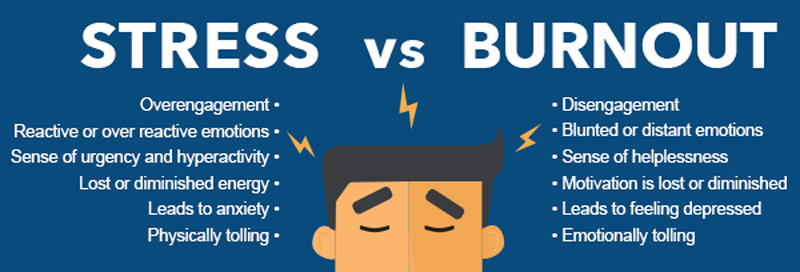In this day and age stress surrounds us. It comes at us from all angles: work, home, family, finances, and our physical health. Each of us have developed various ways to cope with stress so that we can overcome such challenges. But what is too much stress and what does it create in us? You’ve heard co-workers or even yourself saying it, “I’m burnt out!”
Stress vs Burnout
The line between stress and burnout is a blurred one, and it’s often difficult to see where one ends and the other begins. Burnout is the accumulation of unchecked and built up stress over a period of time. Think of burnout as the larger, meaner, older brother of stress. It requires stress to exist, but you can have stress without being burnt out. So how do you know the difference? Here are a few key signs.

Stress and fatigue are a daily experience for most. With stress there is an end in sight, but getting there may be difficult. Burnout on the other hand is a cycle of negative emotions and withdrawal that result from investing too much into something emotionally, intellectually, or physically without doing anything to restore yourself.
Here Are Some Common Burnout Symptoms to Look Out For:
- Exhaustion: Feeling physically and emotionally drained, lacking energy, and feeling tired all the time.
- Reduced Performance: Difficulty concentrating, reduced productivity, and decreased motivation.
- Cynicism and Detachment: A feeling of detachment from work and colleagues, and a sense of negativity or cynicism towards work.
- Emotional Distress: Feeling anxious, irritable, or sad, and experiencing mood swings.
- Physical Symptoms: Physical symptoms such as headaches, muscle pain, and stomach problems.
- Insomnia: Difficulty sleeping or staying asleep, or waking up feeling unrefreshed.
- Loss of Satisfaction: Feeling like your work is not fulfilling, and losing satisfaction or enjoyment from the work that you used to enjoy.
- Increased Absenteeism: Taking more sick days or time off work than usual, or finding excuses to avoid work.
- Neglecting Personal Needs: Neglecting personal needs such as exercise, hobbies, and socializing, and focusing solely on work.
It’s important to note that not everyone experiences burnout in the same way, and symptoms can vary from person to person. If you’re experiencing any of these symptoms, it’s important to take steps to address them and seek support if necessary.
Stressed?
You don’t have to manage your stress, anxiety or burnout alone. You’ve got us.
See an online therapistExperiencing large amounts of stress is often enough of a reason for folks to seek out the assistance from a psychologist. However, with burnout it is imperative to seek out professional help as its main symptoms encourage further and further isolation and withdrawal, potentially to the point of depression. Whether you’re stressed, fatigued, or burnt out, a psychologist like myself can help you overcome your challenges.
Here are 10 Ways to Help Reduce Stress and Burnout
- Practice Mindfulness: Mindfulness is the practice of being present and fully engaged in the current moment. This can include breathing exercises, meditation, or simply being aware of your thoughts and emotions without judgment.
- Exercise: Exercise is a great way to reduce stress and improve mood. You can try yoga, running, dancing, or any form of physical activity that you enjoy.
- Get Enough Sleep: Getting enough sleep is crucial for reducing stress and improving overall health. Make sure to prioritize your sleep and create a bedtime routine that helps you wind down.
- Prioritize Self-Care: Taking care of yourself is essential for preventing burnout. Make time for activities that you enjoy, such as reading, taking a bath, or spending time in nature.
- Connect with Others: Social support is an important factor in reducing stress and preventing burnout. Make time to connect with friends and loved ones, or join a support group if you’re feeling overwhelmed.
- Practice Time Management: Poor time management can contribute to stress and burnout. Try using a planner or scheduling app to help you prioritize tasks and manage your time more effectively.
- Limit Screen Time: Spending too much time on electronic devices can contribute to stress and burnout. Try setting limits on your screen time and take regular breaks to rest your eyes and recharge.
- Practice Relaxation Techniques: Relaxation techniques such as deep breathing, progressive muscle relaxation, or visualization can help you feel more calm and centered.
- Set Boundaries: Setting boundaries is important for preventing burnout. Learn to say no to requests that are beyond your capacity or set limits on your availability.
- Seek Professional Help: If you’re feeling overwhelmed or experiencing symptoms of burnout, don’t hesitate to seek professional help. A therapist or counselor can provide support and guidance for managing stress and improving mental health.
Whether it’s work stress, relationship issues, or trouble sleeping, Doctor On Demand has a therapist that will work with you on a personalized plan to achieve your goal.
About the author

Dr. Craig Dike completed his doctorate in clinical psychology at the University of Indianapolis, internship at Texas State University, and post-doctoral fellowship at UC San Diego/VA, where he specialized in psychiatric rehabilitation. Dr. Dike has additional specialty training in treating panic disorders, PTSD, phobias, and OCD. He enjoys working with primary care physicians helping patients engage in healthier behaviors by treating insomnia, reducing chronic pain, smoking cessation, and utilizing biofeedback. He continues to teach, provide workshops and lectures, as well as train residents in strong evidence based treatments. Whenever possible, he participates in clinical research that addresses a wide range of areas within the field of therapy and evidence-based treatments. Based in Texas, he enjoys spending time with family and friends over a craft beer and brisket, and enthusiastically supporting his favorite soccer team Tottenham Hotspur.



